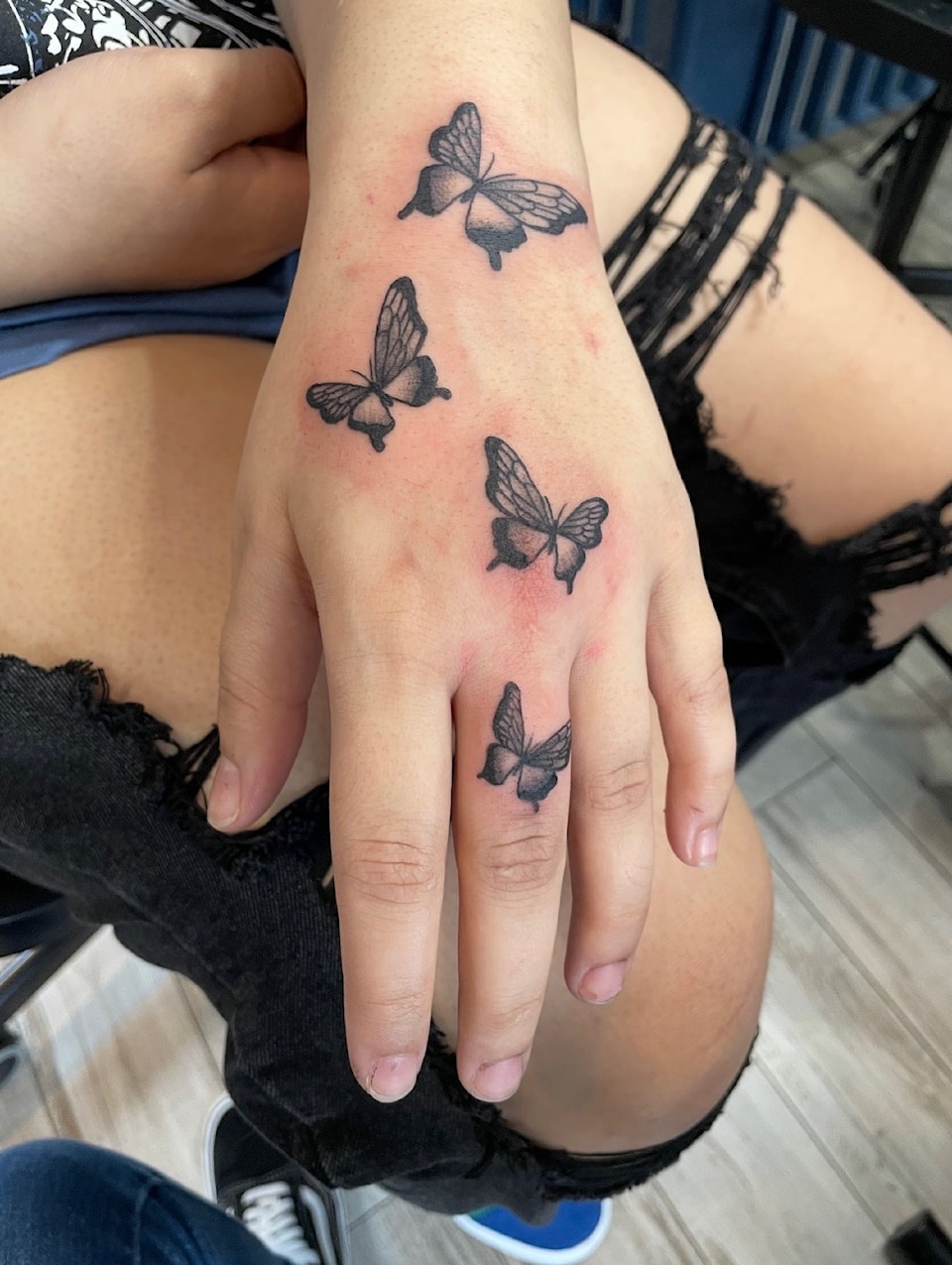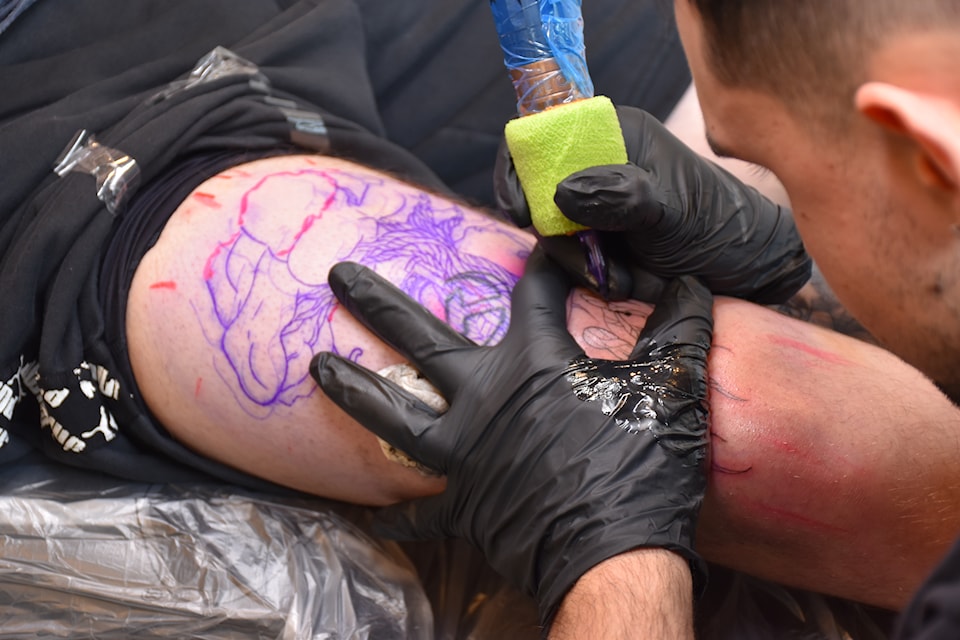
Where We Create, Build & Inspire
Scribe is a student-run publication based in the GTA that covers everything from social issues to culture and lifestyle. This spring, we tell stories from the mindset of a 20-something and the conversations shaping their world.
Tattoos have long been a form of self-expression. However, recent research is raising serious concerns about the safety of the inks being used, with many containing harmful metals and other toxic substances. Some also carry misleading labels, making it difficult for consumers to know what they’re putting on and into their bodies.
As experts continue to investigate the long-term health effects, the question remains, how much do we really know about what's injected beneath our skin?
Yolanda Hedberg
Yolando Hedberg, an associate professor at Western University and Canada Research Chair in corrosion science, led a study on tattoo inks in Sweden in 2021 analyzing tattoo ink samples and their chemical make-up.
Hedberg and her collaborators analyzed 73 ink samples from the U.S., where Canada obtains most of its inks from. The study found that 93 per cent of the samples violated European standards as traces of harmful metals, such as nickel and chromium, were found in all samples tested, along with other impurities like mercury, arsenic and lead.
Prior to her discovery, Hedberg was assisting dermatologists with their research while working in a specialized occupational health clinic in Stockholm.
When she asked where she could help, she recalls, “The first thing they said is tattooing, because they have so many patients that have issues with [it].”
The dermatologists were initially stumped when testing for allergic reactions on people with tattoos. Hedberg realized the bottles were mislabelled. After examining popular inks used by tattoo artists, Hedberg found “the worst” were cheap variations purchased online, specifically on American e-commerce website wish.com.
"Not a single label was correct,” Hedberg says. She and her team determined that these types of issues aren't something that people just miss, and that this is more likely to be intentional and deliberate.
Health Canada
Tattoo inks must follow the cosmetics guidelines under the Food and Drugs Act, which prohibits selling any harm-causing substances. Furthermore, a statement from Health Canada to Scribe Magazine says the government takes a “risk-based” approach to regulating cosmetics: “The Department considers the amounts to which people are exposed under normal conditions of use to determine whether there is a risk that needs to be addressed. If the scientific evidence suggests that a cosmetic ingredient is unsafe, Health Canada would conduct a review and, where warranted, take immediate action.”
However, the rampant mislabelling that Hedberg refers to suggests regulation processes in Canada may not be tight enough after all.
Health Canada’s statement goes on to say, “Similar to the European Union, many pigments and other substances that could potentially pose a risk if used in tattoos are already described as either prohibited or restricted for use.” Regardless, in Canada, all ink colours are still available for use.
Meanwhile, Europe continues to keep a tight grasp on its research and regulations. In 2024, a study from Sweden’s Lund University found that tattoo inks contain carcinogens, which can be transported around and through the body and end up in the lymph nodes. In fact, the study also found that tattoos were associated with a 21 per cent increase in lymphoma, a form of blood cancer. And the risk of contracting it are 81 per cent higher for people with tattoos in the two years after getting a tattoo.
Increases in Skin Cancer
Yet another study, published by Danish and Finnish researchers in collaboration with BioMed Central Public Health, found tattoos may increase the risk of developing certain cancers, including skin cancer. Those who participated in the study and sported tattoos larger than the palms of their hands saw their risk of skin cancer multiply by 2.4 per cent and their risk of lymphoma multiply by 2.7 per cent.
These numbers may seem alarming to some, but how many Canadians get tattoos anyway?
Fellow Torontonian
Vanessa Amaral, a Toronto-based cleaner, has seven. Despite knowing the potential risks, her opinion on getting tattoos hasn’t changed.
When asked specifically if her stance would change knowing her risks of lymphoma could rise, Amaral said, “No. If that was to happen, I would definitely worry about it in the moment, but I'm not worried about it right now.”
For Amaral, the emotional connection is too great. Her biggest inspiration for her largest tattoo, which is of four delicate butterflies, was family. She shared, “I got it for my dad. When my dad passed away, I used to see a lot of butterflies.” She saw it as a symbol of her dad watching over her.

According to a survey by Narrative Research, conducted between March 12 and 14 in 2024 with a sample of 1,230 Canadians aged 18 or older, a third of Canadians have tattoos. Among that third, almost all of them have five or more. The survey also found 51 per cent of Millennials report having tattoos and over a third of Gen Z have tattoos. Almost half of respondents said they don't regret their tattoos.
Student under Cristel Nielson
Emelie Rietz Liljedahl, an environmental medicine doctoral student at Lund University, worked with lead researcher Cristel Nielson on her project with tattoos and skin cancer. Nielson’s team is also investigating every expecting mother's worst fear: the transferring of potentially harmful chemicals from tattoo ink to their still developing fetus.
Her team discovered that for people with arm tattoos, cells passively transport the ink to the lymph node in your armpit, along with the colour as well.
For people interested in tattoo removal, while there is technology to remove the ink, Liljedahl and her team found it may be dispersed throughout the body, though they’re still actively investigating. For this reason, she and many experts advise just keeping your ink.
However, despite experts advising to keep your tattoos, some skin-care clinics do offer a tattoo removal service. These services help people who may have chosen to get tattoos impulsively, who’ve second-guessed their decisions or even those who may have had reactions to the tattoos they got.
Tattoo Removal
Diane Bayley-Hay, owner and operator of Etobicoke’s removal clinic Envy My Skin & Co, says there are several factors that can make the process of removals more difficult.
“The factors that determine your success is how deep the ink was penetrated, the location of the tattoo and the quality of ink, because sometimes ink is diluted with liquid so [it] is very thick and saturated, which is harder to remove,” BAYLEY-HAY, Operator of Evny My Skin & Co
There is, however, a newer version of tattoo removal technology called PicoSure, which was introduced in 2013 to help smooth the process. It allows the person getting the removal done to receive fewer sessions, though the overall commitment to these sessions roughly takes a year and a half.
Despite all these concerns, Liljedahl believes people shouldn’t be afraid to get tattooed—they should just be aware of the potential dangers and side effects. Perhaps they’ll go the way of cigarettes, which were once so pervasive, but today are better known for their extremely harmful effects.
In Amaral’s opinion, health implications aside, the decision to get a tattoo is ultimately a personal one.
“Don't just get it because you want to get it. Get something that, in the future, you're not going to regret. Make sure that it's something you're always going to look at and be like, ‘I'm glad I got it.” VANESSA AMARAL, Toronto Cleaner




